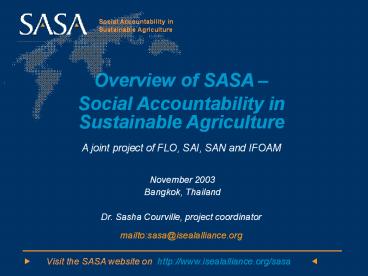Overview of SASA - PowerPoint PPT Presentation
1 / 18
Title:
Overview of SASA
Description:
FLO - Fairtrade Labelling Organizations International. SAI ... Burkina Faso. Mangos. 2. Colombia. Cut Flowers. Round. Country. Crop. Social Accountability in ... – PowerPoint PPT presentation
Number of Views:248
Avg rating:3.0/5.0
Title: Overview of SASA
1
Overview of SASA Social Accountability in
Sustainable Agriculture A joint project of FLO,
SAI, SAN and IFOAM November 2003 Bangkok,
Thailand Dr. Sasha Courville, project
coordinator mailtosasa_at_isealalliance.org
2
FLO - Fairtrade Labelling Organizations
International SAI - Social Accountability
International SAN - Sustainable Agriculture
Network IFOAM - International Federation of
Organic Agriculture Movements
ISEAL and FAO are Project Partners
3
- FLO - Fairtrade Labelling Organizations
International - Founded in 1997
- Structure includes 17 national member initiatives
(more coming!) with producer and trader
representation - producer registers coffee, tea, cocoa, honey,
sugar, orange juice, bananas, rice, with
more coming - Main focus fairtrade and social justice for
smallholders and disadvantaged plantations
in developing countries - Key instruments fairtrade premium and minimum
floor price, long-term trade relationships
4
- SAI Social Accountability International
- Founded in 1997
- Wide stakeholder representation
- Focus social accountability in the workplace
- Certifies facilities and their management systems
across many sectors - Key instruments SA 8000 standard based on
fundamental ILO conventions, accredits
certification bodies worldwide
5
- SAN - Sustainable Agriculture Network
- Formed in 1991
- Coalition of independent non-profit conservation
groups - Secretariat is Rainforest Alliance
- Main focus social and environmental conditions
in tropical agriculture - Key instruments certification and labelling
ECO-OK and Better Banana Project labels
now under one - Products for certification coffee, cocoa,
bananas, citrus, sugar cane, cut-flowers
6
- IFOAM - International Federation of Organic
Agriculture Movements - Founded in 1972
- Over 750 member organisations in 100 countries
- Main focus environmental protection through
organic agriculture, holistic understanding - Key instruments basic standards, accreditation
program (International Organic
Accreditation Service)
7
- SASA - Social Accountability in Sustainable
Agriculture - is a collaborative project of four
social and environmental verification systems,
which aims to - develop tools and guidelines for the
implementation of social audits across a wide
range of agricultural systems - foster convergence between the four collaborating
initiatives FLO, SAI, SAN, IFOAM through shared
learning
8
- Tools for social auditing
- To develop best practice guidelines for social
auditing and standard-setting in sustainable
agriculture - Supply chain considerations
- To examine supply chain actors impacts and
responsibilities - Small holders
- To address particular needs of smallholder
producers - Mutual promotion
- To explore the possibilities of mutual promotion
of complementary systems
9
(No Transcript)
10
- Workshops and decision-making on specific topics
- Joint research audit exercises at inspection
level
11
- 4 audit exercises completed
- Focus on demonstration of systems and critical
issues - Tremendous learning about each initiative
- Exercise in matching the range of social issues,
standards and auditing methodologies with
different agricultural systems - Certain critical social issues needed more
emphasis - Working hours in seasonal production systems
- Freedom of association and right to collective
bargaining
12
- More targeted audits? ICS for smallholders,
integrated audit methodologies, supply
chain - Standards level discussion included?
interpretation of standards, where thresholds are
set, convergence where possible - More discussion needed? within Steering
Committee how to apply results? with key
stakeholders and constituents preliminary
results and implementation - Focus on tools that support convergence
13
- On social standards and auditing methodologies
- There is significant convergence in social
standards of the participating systems on most
social standards issues - Further coordination and convergence of standards
where possible, especially on difficult social
auditing issues - Significant learning in best practice audit
methodologies - Health and safety in agriculture learning from
SAN - Smallholder approaches learning from FLO and
IFOAM - Verification of worker rights learning from
SAI - Addressing difficult social auditing issues
- Working Hours, Undocumented Workers
14
- Background to One Stop Shop Approach
- Context
- SASA initiatives are 4 main verification systems
in agriculture - Some overlap but also key differences in approach
(due to missions) and in target clients that
makes these systems distinct - Question - How can these initiatives coordinate
to - Reduce overlaps
- Build synergies between complementary systems
- Provide a high quality alternative to
proliferation of initiatives
15
- One possibility One Stop Shop Approach
- SASA initiatives under one roof through ISEAL
I.e. Star Alliance - Distinct initiatives but coordination through a
seamless interface to improve service to
producers and workers, supply chain companies,
retailers and consumers - Requires coordination in delivery of products to
clients but also in supporting processes to be
able to deliver effective solutions
16
- Currently under discussion
- General information and self-evaluation tools to
producers - Capacity building and extension support (without
conflict of interest) - Cooperation in auditor training
- Integrated audits and reduced documentation
burdens - Appropriate and cost-effective certification
packages for use by brand name companies,
retailers and consumers
17
Oct. 03 - Feb. 04 Evaluation workshops targeting
key stakeholder groups Nov.03 - Jan 04 Final
audit exercises trialling the One Stop Shop
coffee cotton April 20-21st 2004 Final
SASA Conference at FAO, Rome Then Implementa
tion
18
- For Discussion
- What are the current problems you face in using
various social and environmental certification
systems? - How could the One Stop Shop approach meet your
social and environmental certification needs ? - Particular features of issues to be considered
to make the One Stop Shop useful and accessible
to you































